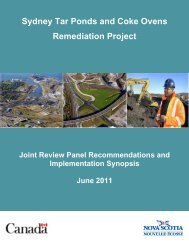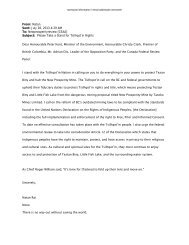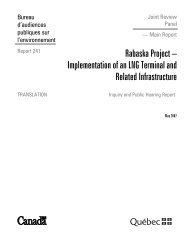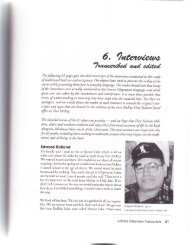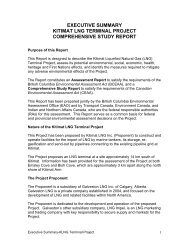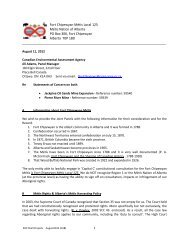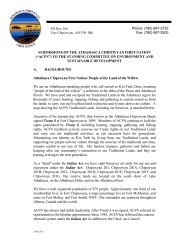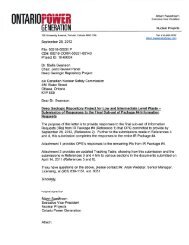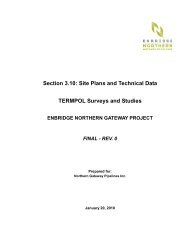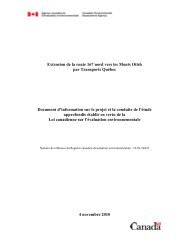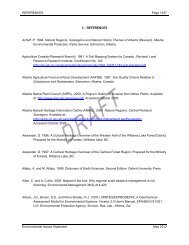Kearl Oil Sands Project
Kearl Oil Sands Project
Kearl Oil Sands Project
Create successful ePaper yourself
Turn your PDF publications into a flip-book with our unique Google optimized e-Paper software.
The judgment of the Court was delivered by<br />
I.T. DONALD J.A.:--<br />
Introduction<br />
1 This is one of those cases foreseen by the Supreme Court of Canada in Haida Nation v. British<br />
Columbia (Minister of Forests), 2004 SCC 73, [2004] 3 S.C.R. 511, where the broad general<br />
principles of the Crown's duty to consult and, if necessary, accommodate Aboriginal interests are to<br />
be applied to a concrete set of circumstances.<br />
2 Consultation arises here in relation to the decision of British Columbia Hydro and Power<br />
Authority (B.C. Hydro) to buy electricity from Rio Tinto Alcan Inc. (Alcan) which is surplus to its<br />
smelter requirements, in accordance with an Energy Purchase Agreement (EPA) made in 2007.<br />
3 For the EPA to be enforceable, B.C. Hydro needs the approval of the British Columbia Utilities<br />
Commission (Commission) under s. 71 of the Utilities Commission Act, R.S.B.C. 1996, c. 473.<br />
4 The Carrier Sekani Tribal Council (the appellant) sought to be heard in the s. 71 proceeding<br />
before the Commission on the issue of whether the Crown fulfilled its duty to consult before B.C.<br />
Hydro entered into the EPA.<br />
5 The appellant's interest (asserted both in a pending action for Aboriginal title and within the<br />
treaty process) is in the water and related resources east of the discharge of the Nechako Reservoir<br />
created by Alcan in the early 1950s to drive its generators in Kemano for use at the Kitimat<br />
aluminum smelter.<br />
6 The appellant claims that the diversion of water for Alcan's use is an infringement of its rights<br />
and title and that no consultation has ever taken place.<br />
7 The Commission considered the appellant's request as a reconsideration of its decision, made<br />
prior to the appellant's involvement, that consultation was not relevant and, thus, not within the<br />
scope of its proceeding and oral hearing (the Scoping Order). It was held not to be relevant then<br />
because the only First Nations groups involved at that point were the Haisla First Nation and the<br />
Haisla Hereditary Chiefs, who did not press the issue of consultation.<br />
8 The Commission addressed the reconsideration in two phases. At Phase I, the Commission<br />
"concluded that the CSTC [Carrier Sekani Tribal Council] established a prima facie case sufficient<br />
to warrant a reconsideration of the Scoping Order", and that the ground for reconsideration was "the<br />
impacts on the water flows arising from the 2007 EPA": Reasons for Decision, "Impacts on Water<br />
Flows", 29 November 2007 (Letter No. L-95-07). Within Phase I, the Commission conducted a<br />
fact-finding hearing into water flow impacts and concluded as follows:<br />
The Commission Panel accepts the submissions of counsel for B.C. Hydro<br />
Page 4



